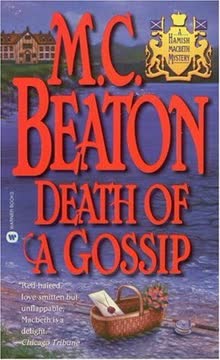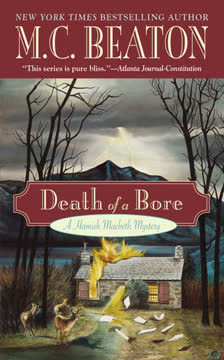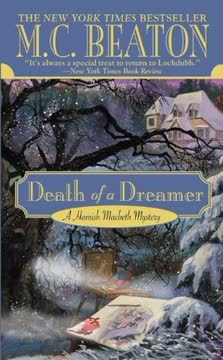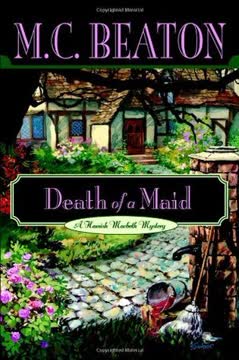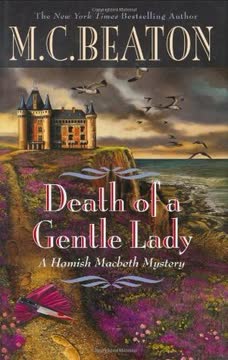Plot Summary
Arrival at Lochdubh
The story opens in the remote Scottish village of Lochdubh, where John and Heather Cartwright run a prestigious angling school. The Cartwrights, passionate about fishing, prepare for a new week with a diverse group of guests, each bringing their own quirks and secrets. Among them are the abrasive Lady Jane Winters, the American Roths, the ambitious Jeremy Blythe, shy Alice Wilson, the troubled child Charlie Baxter, the enigmatic Major Frame, and the sophisticated Daphne Gore. The local constable, Hamish Macbeth, is introduced as a laid-back but observant figure, quietly attuned to the undercurrents of village life. The stage is set for a week of fishing, camaraderie, and, beneath the surface, simmering tensions.
The Angling School Assembles
The guests gather for their first lesson, and the group's dynamics quickly emerge. Lady Jane's domineering presence and sharp tongue immediately set her apart, antagonizing both guests and hosts. Alice, insecure and eager to impress, feels out of place, while Jeremy and Daphne's flirtation stirs jealousy. The Cartwrights try to maintain order, but Lady Jane's disruptive behavior—both in the classroom and on the loch—creates friction. Hamish Macbeth, ever the outsider, observes the group with a mixture of amusement and concern, sensing that Lady Jane's presence will be a catalyst for trouble.
Lady Jane's Antagonism
Lady Jane's penchant for gossip and her knack for uncovering others' vulnerabilities become apparent. She needles the major about his military past, humiliates Alice for her background, and provokes Marvin Roth with veiled threats. Her ability to find and exploit weaknesses unsettles everyone, binding the group in mutual resentment. Even the usually unflappable Hamish is not immune to her barbs. The guests, united only by their dislike of Lady Jane, begin to wish for her absence, and the atmosphere grows increasingly tense.
Tensions and Secrets Surface
As the days pass, the guests' personal anxieties come to the fore. Alice worries about her juvenile record being exposed, Jeremy fears for his political ambitions, and the Roths are haunted by secrets from their pasts. Lady Jane's probing questions and insinuations keep everyone on edge. The Cartwrights, too, are not immune; a letter from Austria warns them of Lady Jane's destructive power as a columnist. The group's camaraderie is fragile, with alliances shifting and suspicions mounting. The sense of foreboding intensifies as Lady Jane's influence grows.
Bonds and Rivalries
Amidst the tension, relationships develop and unravel. Alice is drawn to Jeremy, but Daphne's allure and social standing threaten her hopes. The major's bluster masks insecurity, while Charlie's precociousness hides pain from his parents' divorce. The Roths' marriage shows cracks under pressure. Fishing, meant to unite, becomes another arena for rivalry and disappointment. Lady Jane's continued provocations push everyone to their limits, and the group's collective animosity toward her deepens, setting the stage for tragedy.
The Gossip's Shadow
It becomes clear that Lady Jane is not just a meddler but a professional gossip columnist, Jane Maxwell, who specializes in exposing the secrets of small, exclusive groups. The Cartwrights realize too late the danger she poses to their school's reputation. Each guest fears what Lady Jane might reveal about them, and the sense of being trapped with her grows unbearable. The emotional stakes are raised as Lady Jane's threats become more explicit, and the group's unity is now forged by shared dread.
A Fatal Discovery
During a fishing outing, John Cartwright hooks something heavy in the river. To everyone's horror, it is Lady Jane's corpse, strangled and weighed down with chains. The group is shocked, but beneath the fear is a grim sense of relief. Hamish Macbeth takes charge, quickly realizing this is no accident. The murder transforms the holiday into a crime scene, and the guests, once united in resentment, are now bound by suspicion and fear. The idyllic setting is shattered, and the true nature of each character begins to emerge.
The Investigation Begins
Detective Chief Inspector Blair arrives from Strathbane, dismissing Hamish as a mere village bobby. The guests are interrogated, their alibis and backgrounds scrutinized. Blair's heavy-handed approach only increases the group's anxiety. Hamish, quietly persistent, begins his own investigation, relying on local knowledge and intuition. The Cartwrights admit they knew Lady Jane's true identity, and each guest's motive for murder is explored. The sense of claustrophobia intensifies as the police close in, and trust among the group erodes.
Suspects and Skeletons
As Blair and his team dig deeper, the secrets Lady Jane threatened to expose come to light. Marvin Roth's shady business past, Amy's fabricated Southern aristocracy, Jeremy's Oxford scandals, Alice's juvenile crime, Daphne's psychiatric history, and the major's falsified war record—all are revealed. Each guest had reason to fear Lady Jane, and each becomes a plausible suspect. Hamish, meanwhile, notices subtle clues and inconsistencies, convinced that the answer lies in understanding the psychology of the group.
Hamish's Quiet Pursuit
While Blair focuses on obvious motives, Hamish pursues quieter leads. He consults his network of relatives and contacts, piecing together Lady Jane's methods and the guests' backgrounds. He observes Amy Roth's restlessness, the Cartwrights' desperation, and Alice's vulnerability. Hamish's empathy and insight allow him to see past the facades, and he begins to suspect that the murderer is someone who has mastered the art of concealment. His investigation is methodical, patient, and deeply human.
The Web Tightens
Hamish uncovers a torn photograph, a missing leader (fishing line), and a planted piece of blue fabric. He realizes that someone is trying to mislead the investigation. Amy Roth's behavior grows increasingly erratic, and her husband's devotion becomes a double-edged sword. The group, exhausted and frayed, clings to the hope that the police will soon let them go. Hamish, however, is convinced that the murderer is still among them and that justice requires understanding, not just evidence.
The Truth in the Shadows
Through a combination of intuition, local knowledge, and psychological insight, Hamish identifies Amy Roth as the murderer. Lady Jane had discovered Amy's past as a Brooklyn stripper and threatened exposure. Amy, driven by fear and pride, killed Lady Jane to protect her secret and her marriage. Hamish's confrontation is quiet but relentless, and Amy's confession is as much an act of exhaustion as of guilt. The group is stunned, and Marvin's loyalty to Amy is both touching and tragic.
The Confession
In a tense gathering, Hamish lays out the evidence and psychological motives before the assembled guests and police. Amy, faced with the truth and her husband's unwavering support, confesses to the murder. Her motive is not just self-preservation but a refusal to be humiliated or controlled by Lady Jane. The confession is both a release and a condemnation, exposing the destructive power of secrets and the corrosive effects of shame. The group is left to grapple with the aftermath, their own complicity, and the fragility of their facades.
Aftermath and Farewell
With the case solved, the guests prepare to leave Lochdubh. Relationships are shattered—Alice's dreams of love with Jeremy are crushed, and the Cartwrights' school survives but is forever altered. Hamish, quietly triumphant, reflects on the nature of justice and the cost of truth. The village returns to its rhythms, but the memory of Lady Jane's death lingers. The survivors carry their scars home, changed by the ordeal and the revelations it forced upon them. Hamish, ever the outsider, remains the quiet guardian of Lochdubh's secrets.
Characters
Hamish Macbeth
Hamish is the local policeman of Lochdubh, tall, red-haired, and seemingly indolent, but with a sharp mind and deep empathy. He is an outsider in both the village and the world of the wealthy guests, yet his understanding of human nature and local dynamics makes him uniquely suited to unraveling the mystery. Hamish's investigative style is patient and intuitive, relying on observation and quiet questioning rather than force. His unassuming manner masks a keen intelligence and a strong moral compass. Throughout the story, Hamish's compassion and insight allow him to see past social facades, making him both a comforting presence and a formidable detective.
Lady Jane Winters
Lady Jane is a heavyset, imperious widow with a talent for uncovering and exploiting others' secrets. As a professional gossip columnist, she thrives on the pain and humiliation of those around her, wielding her knowledge as a weapon. Her presence at the angling school is disruptive, sowing discord and fear among the guests. Lady Jane's need for control and her lack of empathy make her universally disliked, and her murder is both shocking and, to some, a relief. Psychologically, she embodies the destructive power of shame and the dangers of unchecked curiosity.
Alice Wilson
Alice is a young, shy secretary from London, desperate to reinvent herself and win the affection of Jeremy Blythe. Haunted by a minor juvenile crime, she is acutely sensitive to social status and the threat of exposure. Alice's journey is one of self-discovery and disillusionment; her romantic dreams are shattered by Jeremy's indifference and Lady Jane's manipulations. Her vulnerability makes her both a target and a red herring in the investigation. Ultimately, Alice's arc is about learning to accept herself and the limits of fantasy.
Jeremy Blythe
Jeremy is a barrister with political aspirations, attractive and socially adept but deeply self-interested. His past is marred by scandal, and he is terrified of Lady Jane's potential to ruin his future. Jeremy's relationships with Alice and Daphne are transactional, driven by ambition and desire for status. He is both victim and perpetrator in the web of secrets, and his inability to form genuine connections leaves him isolated. Jeremy's psychological complexity lies in his blend of charm, ruthlessness, and insecurity.
Amy Roth
Amy presents herself as a genteel Southern belle, but her past as a Brooklyn stripper and her fabricated identity are at the heart of the novel's mystery. Her marriage to Marvin is both a refuge and a source of anxiety, as she fears exposure and loss. Amy's psychological profile is marked by a deep need for control and a terror of humiliation. Her decision to murder Lady Jane is both an act of desperation and a refusal to be victimized. Amy's confession reveals the corrosive effects of shame and the lengths to which people will go to protect their secrets.
Marvin Roth
Marvin is a wealthy New Yorker with political ambitions, married to Amy and fiercely protective of her. His own history of shady business dealings makes him vulnerable to Lady Jane's threats. Marvin's love for Amy is genuine, but his inability to protect her from herself is tragic. He is both a suspect and a victim, and his loyalty is tested to the breaking point. Marvin's psychological struggle is between self-preservation and devotion.
Heather Cartwright
Heather is the backbone of the angling school, managing both the business and her husband John. She is calm and nurturing, but the threat Lady Jane poses to their livelihood exposes her fears and insecurities. Heather's relationship with John is one of mutual dependence, and her willingness to bend the truth for the sake of the school reveals her moral ambiguity. She represents the ordinary person caught in extraordinary circumstances.
John Cartwright
John is the angling instructor, dedicated to his craft but easily rattled by conflict. His pride in the school is matched by his dependence on Heather. The arrival of Lady Jane threatens everything he has built, and his desperation leads him to confront her directly. John's psychological arc is one of fear, guilt, and relief as the truth comes to light.
Major Peter Frame
The major is a self-styled war hero whose actual past is less illustrious than he claims. He is both comic and pitiable, his bluster masking deep insecurity. Lady Jane's exposure of his lies humiliates him, making him a prime suspect. The major's psychological need for respect and belonging drives much of his behavior, and his eventual exoneration is bittersweet.
Daphne Gore
Daphne is beautiful, wealthy, and emotionally guarded. Her past includes a scandalous affair and a period of psychiatric care, making her vulnerable to Lady Jane's probing. Daphne's rivalry with Alice and her flirtation with Jeremy are both defenses against her own insecurities. She is both a suspect and a symbol of the damage caused by social expectations and gossip.
Charlie Baxter
Charlie is a twelve-year-old boy caught in the crossfire of his parents' divorce. His intelligence and emotional detachment make him both an observer and a potential suspect. Charlie's relationship with his mother is fraught, and his longing for acceptance and normalcy is palpable. He represents the collateral damage of adult secrets and lies.
Plot Devices
Closed Circle Mystery
The novel employs the classic "closed circle" device: a small group of people, isolated in a remote location, with one among them a murderer. This structure heightens the sense of claustrophobia and suspicion, as each character's secrets and motives are gradually revealed. The isolation of Lochdubh, both geographically and socially, amplifies the psychological pressure on the guests, making every interaction fraught with meaning.
Red Herrings and Misdirection
Beaton skillfully uses red herrings to keep readers guessing. Each character has a plausible motive, and evidence is planted or misinterpreted to implicate various suspects. The planted blue fabric, the missing leader, and the torn photograph all serve to mislead both the police and the reader. This device sustains suspense and encourages active engagement with the mystery.
Psychological Profiling
Unlike many detective stories that rely on physical clues, "Death of a Gossip" emphasizes psychological insight. Hamish's success as a detective comes from his ability to read people, understand their fears and desires, and empathize with their pain. The resolution hinges not on forensic evidence but on understanding the emotional dynamics of the group and the psychological toll of shame and secrecy.
Social Satire
The novel satirizes British class consciousness, social climbing, and the destructive power of gossip. Lady Jane's role as a professional gossip is both a plot device and a commentary on the dangers of curiosity and the hunger for scandal. The guests' anxieties about status, reputation, and exposure drive the plot and provide a lens for examining broader social issues.
Foreshadowing and Irony
Beaton uses foreshadowing—such as the group's collective wish for Lady Jane's demise and the early hints of Amy's restlessness—to prepare the reader for the eventual revelation. Irony pervades the story, from the guests' relief at Lady Jane's death to the ultimate exposure of their own secrets. The novel's structure and tone balance humor and darkness, making the resolution both satisfying and thought-provoking.
Analysis
"Death of a Gossip" is more than a conventional whodunit; it is a sharp, witty exploration of the corrosive effects of secrets, shame, and social ambition. M.C. Beaton uses the microcosm of the Lochdubh angling school to dissect the British class system, the hunger for status, and the dangers of unchecked curiosity. The novel's strength lies in its psychological depth—each character is both a suspect and a victim, shaped by their pasts and terrified of exposure. Hamish Macbeth, with his gentle wisdom and outsider's perspective, embodies the virtues of empathy and patience, offering a counterpoint to the brutality of Lady Jane's gossip. The murder is not just a crime but a symptom of a society obsessed with reputation and power. Ultimately, the novel suggests that true justice requires understanding, not just punishment, and that the greatest threat to happiness is the fear of being truly known.
Last updated:
Review Summary
Death of a Gossip introduces Hamish Macbeth, a laid-back Scottish village constable who proves more shrewd than he appears when investigating a murder during a fly-fishing trip. Readers enjoy the Highland setting, quirky characters, and Hamish's charm, though some find the plot weak and characters stereotypical. The book is described as a light, cozy mystery with humor and an old-fashioned feel. While not universally loved, many readers find it an enjoyable start to the series and look forward to more Hamish Macbeth mysteries.
Hamish Macbeth Series
Similar Books
Download PDF
Download EPUB
.epub digital book format is ideal for reading ebooks on phones, tablets, and e-readers.
